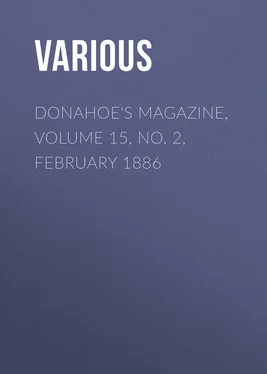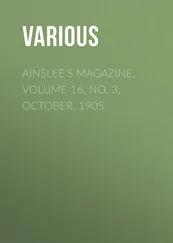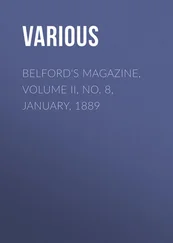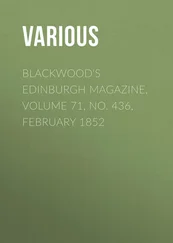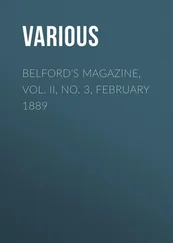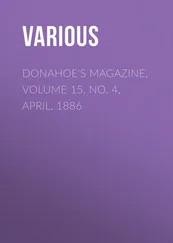Various - Donahoe's Magazine, Volume 15, No. 2, February 1886
Здесь есть возможность читать онлайн «Various - Donahoe's Magazine, Volume 15, No. 2, February 1886» — ознакомительный отрывок электронной книги совершенно бесплатно, а после прочтения отрывка купить полную версию. В некоторых случаях можно слушать аудио, скачать через торрент в формате fb2 и присутствует краткое содержание. Издательство: Иностранный паблик, Жанр: foreign_edu, periodic, на английском языке. Описание произведения, (предисловие) а так же отзывы посетителей доступны на портале библиотеки ЛибКат.
- Название:Donahoe's Magazine, Volume 15, No. 2, February 1886
- Автор:
- Издательство:Иностранный паблик
- Жанр:
- Год:неизвестен
- ISBN:нет данных
- Рейтинг книги:4 / 5. Голосов: 1
-
Избранное:Добавить в избранное
- Отзывы:
-
Ваша оценка:
- 80
- 1
- 2
- 3
- 4
- 5
Donahoe's Magazine, Volume 15, No. 2, February 1886: краткое содержание, описание и аннотация
Предлагаем к чтению аннотацию, описание, краткое содержание или предисловие (зависит от того, что написал сам автор книги «Donahoe's Magazine, Volume 15, No. 2, February 1886»). Если вы не нашли необходимую информацию о книге — напишите в комментариях, мы постараемся отыскать её.
Donahoe's Magazine, Volume 15, No. 2, February 1886 — читать онлайн ознакомительный отрывок
Ниже представлен текст книги, разбитый по страницам. Система сохранения места последней прочитанной страницы, позволяет с удобством читать онлайн бесплатно книгу «Donahoe's Magazine, Volume 15, No. 2, February 1886», без необходимости каждый раз заново искать на чём Вы остановились. Поставьте закладку, и сможете в любой момент перейти на страницу, на которой закончили чтение.
Интервал:
Закладка:
Though this State, in which my hero passed the greater part of his holy life, be the Switzerland of America, a grandly beautiful section, full of picturesque rivers, tall mountains, and dreamy-looking lakes, attracting more tourists than any other place in America save Niagara, yet I will pass over its stern and rugged scenery to write of a man whose titles to our admiration are wholly of the supernatural order.
To me, the finest landscape is but a painted picture unless a human being enliven it. Just one fisherwoman on a sandy beach, or a lone shepherd on a bleak hill-side, and fancy can weave a drama of hope and love and beauty about either. Faith tells of a beautiful immortal soul imprisoned in forms gaunt and shrunken; a prayer that we may meet again in heaven surges up in my heart. The landscape is made alive for me in the twinkling of an eye, and stretches from this lower world to the better and brighter land above. Father MacDonald was for forty-one years the light of a manufacturing town. And when I think of its looms and spindles and fire-engines, and forests of tall, red chimneys, and tens of thousands of operatives, Father MacDonald is the figure which illumines for me the weird and grimy spectacle, and casts over it a halo of the supernatural. Little cared he for the sparkling rivers, or bewitching lakes, or romantic mountains of the Granite State; his whole interest was centred in souls.
Some fifty years ago, Irish immigrants began to come timidly, and in small numbers, to the little manufacturing town of Manchester which rises on both sides of the laughing waters of the Merrimac. Here, in the heart of New Hampshire, one of the original thirteen States, and a stronghold of everything non-Catholic, these poor but industrious aliens knocked at the gates of the Puritan 6 6 The Irish Catholic names, Sullivan and Carroll, are stamped on two of the ten counties of New Hamshire, in memory of Revolutionary heroes.
for work. Strong and willing arms were wanted; and Bishop Fitzpatrick, of Boston, learning that some hundreds of Catholics working in the Manchester factories were sighing for the ministrations of a parish, sent Father MacDonald, in July, 1844, to take charge of their spiritual interests.
William MacDonald was born in the county Leitrim, in 1813, being the youngest of a family of six sons and one daughter, whose parents were John MacDonald and Winifred Reynolds. The now aged daughter is the sole survivor of this large family. They were very strictly brought up by their virtuous, pious parents, and through long and chequered lines, were upright, honorable citizens, and thoroughly practical Catholics. Years ago, the writer was told that no descendant of Mr. and Mrs. MacDonald had ever seen the inside of a non-Catholic school. Charles and William became priests, the former emigrating when quite young. William attended the school of his native parish, where he received a solid rudimentary education, after which he pursued his classical studies in Dublin. In 1833, he joined his brother Charles, who was pastor of a church at Charlottetown, Prince Edward Island. Father Charles died in his prime, with a high reputation for sanctity. William always carried about him a little Latin Imitation of Christ, which had also been the vade mecum of his beloved brother. The spiritual life of both was formed in that wonderful book, and Father William was wont to prescribe a suitable chapter in the same for every mental trouble, difficulty, or temptation referred to him.
Father MacDonald's education was finished in the College of Three Rivers, Canada, under the Sulpician Fathers. After his ordination he exercised the ministry in several places till sent by the Bishop of Boston to Manchester. Here he found his co-religionists and countrymen regarded as Helots, and far more despised by Yankee and Puritan than the slaves in the South by their rulers. The Irish were denied the privilege of sidewalks, and obliged, in order to avoid perpetual quarrels, to walk in the middle of the streets. Wherever they appeared, they were hissed and hooted, and "blood-hounds of hell" was the affectionate epithet the ubiquitous small boy bestowed on them. Previous to Father MacDonald's arrival, Father Daly, whose parish included nearly all New Hampshire and Vermont, used to say Mass in Manchester with unfailing regularity every three months. On one of these occasions, the floor of the temporary chapel gave way, and priest, altar, and congregation, were precipitated into the cellar. Providentially, beyond a few bruises and abrasions, no one was injured. The previous day, the bigots having heard that Mass was to be said in the room, had cut the supports from under the floor.
To these people, a priest was an object of hatred and scorn, whom they believed it would be a good work to kill, and Father MacDonald settled among them at the risk of his life. But when duty was in question, he knew not fear. The servant is not greater than his master , he would say: If they have persecuted me they will persecute you also . It was in vain they used every means their perverse ingenuity suggested to intimidate this dangerous papist. They even began to like him. Slowly but surely, he won his way among them, and within a year of his arrival he was able to hire the Granite Hall as a temporary chapel. In 1849, he built a church on a square purchased with his own patrimony, at the corner of Union and Merrimac Streets.
Besides the theological virtues which the "natives" valued not, Father MacDonald possessed all the natural virtues which they pretend to canonize. He was most frugal. To great objects he would give royally, but it was doubtful if he ever wasted a dollar. He sought to live on as little as possible, but it was that he might have more for the needy. He was industrious; not a moment of his day was lost. For many years, he was one of the only two priests in the State; but when his parochial duties left him a little leisure, he was seen to handle the trowel and use the broom. He paid cash for everything he bought, and whoever worked for him received full pay on the day and hour agreed upon: no cutting down of rates. If they wished to give to the church, very well; but they must take their pay from him to the last farthing. He was neatness personified. The fresh complexion and fine physique common among his countrymen he did not possess. Barely reaching middle height, his spare form, sharp features, sallow complexion, and keen, spectacled eyes, made him look like a son of the soil. As for energy, no Yankee ever had more, or perhaps so much. Non-Catholics knew that his power over his flock was absolute. But they admitted that his wish, his word, and his work, were always on the side of order, sobriety, frugality, and good citizenship.
When Father MacDonald's beautiful church was finished, the Know-Nothings, or Native American Party, by way of celebrating in a fitting manner the independence of the United States, burst upon the defenceless Catholics, July 4, tore down their houses, destroyed their furniture, dragged their sick out of bed into the streets, and finally riddled the beautiful stained glass windows of the church. For these damages no compensation was ever made. An Irishman having some dispute with a native, the latter seized a monkey-wrench that was near, and killed him. Father MacDonald asked for justice, but the officials refused to arrest the murderer. Through his wise counsels, the Catholics, though boiling with indignation, did not retaliate, and, as it takes two parties to make a fight, the Know-Nothing excitement having spent itself, soon subsided. But for years, the Irishmen of Manchester and their brave pastor had to take turns at night to guard the church buildings from sacrilegious hands.
So far from being frightened at the lawlessness of the mob, Father MacDonald, at the height of the excitement, announced a daring project. He would bring nuns to Manchester, and he called a meeting of his parishioners to devise ways and means. But, for the first and last time, they strenuously opposed him. "It would be madness. They had frequently heard their employers say they would never allow a nunnery in the city." He soon saw that if he waited for encouragement from any quarter his object would never be accomplished. He built his convent. It was set on fire when completed, but he was not to be baffled. He repaired the damages. Though he declined some compensation offered on this occasion, he was not slow to express his opinion as to the effect such evidences of New England culture might have on his beloved and most generous flock. He invited Sisters of Mercy from Providence, R.I., and had the pleasure of welcoming them, July 16, 1858.
Читать дальшеИнтервал:
Закладка:
Похожие книги на «Donahoe's Magazine, Volume 15, No. 2, February 1886»
Представляем Вашему вниманию похожие книги на «Donahoe's Magazine, Volume 15, No. 2, February 1886» списком для выбора. Мы отобрали схожую по названию и смыслу литературу в надежде предоставить читателям больше вариантов отыскать новые, интересные, ещё непрочитанные произведения.
Обсуждение, отзывы о книге «Donahoe's Magazine, Volume 15, No. 2, February 1886» и просто собственные мнения читателей. Оставьте ваши комментарии, напишите, что Вы думаете о произведении, его смысле или главных героях. Укажите что конкретно понравилось, а что нет, и почему Вы так считаете.
